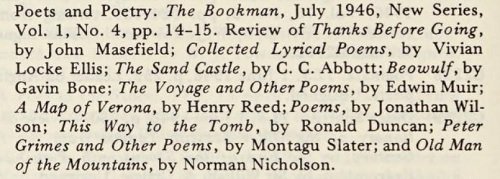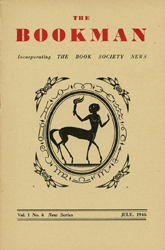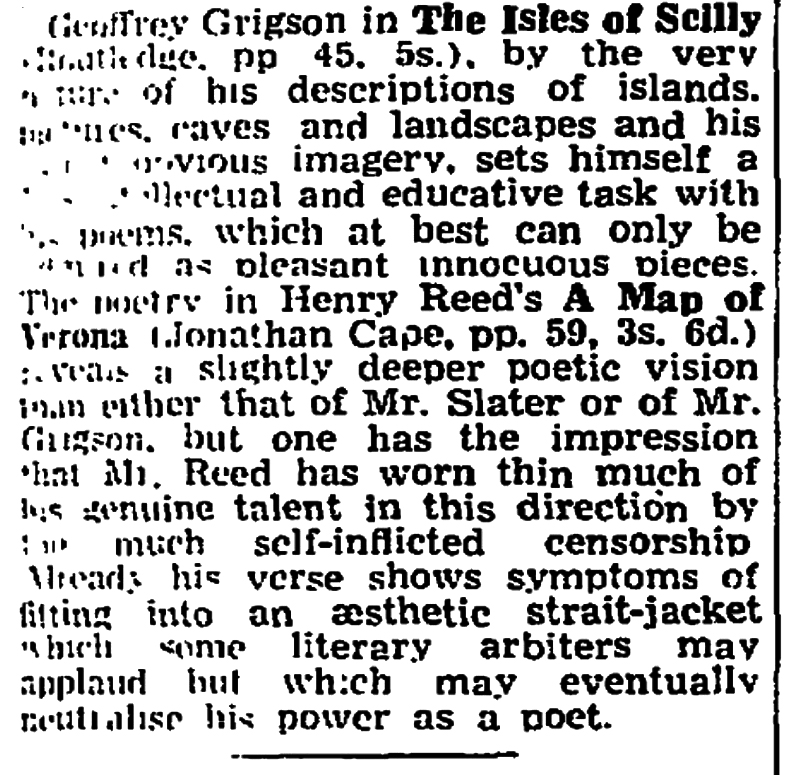Finally, I have a contemporary review of Henry Reed's debut book of poems from 1946, by a critic who should need no introduction: a
World War I poet; the editor of John Clare, Wilfred Owen, and Ivor Gurney; the "true cricketer":
Edmund Blunden.
Blunden's review comes from the July, 1946 issue of
The Bookman. In scouring the
Internet Archive library for references to Reed, we unexpectedly find an entry in
A Bibliography of Edmund Blunden, by B.J. Kirkpatrick (Oxford: Oxford University Press, 1979), on page 458, for "Poets and Poetry":
In this two-page, whirlwind summation, Blunden reviews no fewer than ten books of verse, devoting a paragraph to each:
Thanks Before Going, by John Masefield;
Collected Lyrical Poems, by Vivian Locke Ellis;
The Sand Castle, by Claude Colleer Abbott;
Beowulf, translated by Gavin Bone;
The Voyage and Other Poems, by Edwin Muir;
Poems, by Jonathan Wilson;
This Way to the Tomb, by Ronald Duncan;
Peter Grimes and Other Poems, by Montagu Slater;
Old Man of the Mountains, by Norman Nicholson; and, of course,
A Map of Verona, by Henry Reed.
Blunden holds Muir, Wilson, and Slater in high enough esteem to quote a few stanzas. As for Reed, Blunden reproduces no lines, but he does have this to say:
A group of poems entitled 'Lessons of the War' strikes me as being the most expressive part of Mr. Henry Reed's book. He also has his poems on subjects of ancient fame, such as 'Philoctetes,' but they do not announce his originality so boldly as the pieces mentioned, which have captured something of the time-spirit and ambiguity of the recent war in a style of wit and deep feeling united.
This is high praise for the original, three-part sequence of Reed's war poems: "Naming of Parts," "Judging Distances," and "Unarmed Combat." Especially high coming from Blunden, a WWI veteran and survivor of the Somme and Ypres. For certain, these are the poems which cemented Reed's reputation and continue to this day to keep him in the Canon. If Blunden could only spare a a few lines for Reed, this paragraph speaks volumes.
Here is the
Guardian's Books of the Day column for July 31, 1946, "
Recent Verse." Hugo Manning reviews
Talking Bronco by Roy Campbell,
The Garden by Vita Sackville-West,
Peter Grimes and Other Poems by Montagu Slater,
Isles of Scilly by Geoffrey Grigson, and finally
A Map of Verona, by Henry Reed.
Manning devotes most of his space to Campbell, whose "inspired invective thunders against many things, including Left-wing poets, Jews, Tartuffes, and even the
Beveridge Plan." Manning concludes, however, that "Perhaps Mr. Campbell's muse would become even more considerable if he had fewer bees in his bonnet."
Compared to
Talking Bronco,
The Garden "seems magnificently serene, and well-disposed to humanity," and acts as "a vehicle for [Sackville-West's] pleasant lyricism, and sustained craftmanship."
Manning has less time and fewer niceties for Slater and Grigson, or for Henry Reed:
The poetry in Henry Reed's A Map of Verona (Jonathan Cape, pp. 59, 3s. 6d.) reveals a slightly deeper poetic vision than either that of Mr. Slater or of Mr. Grigson, but one has the impressions that Mr. Reed has worn thin much of his genuine talent in this direction by too much self-inflicted censorship. Already his verse shows symptoms of fitting into an aesthetic strait-jacket which some literary arbiters may applaud but which may eventually neutralise his power as a poet.
Hugo Manning's career was as eccentric as his reputation. Born in 1913 to Jewish parents, he studied music, but ended up working as a journalist in London and Vienna, and then removed to Buenos Aires in the lead up to the Second World War. He served in North Africa with the British Intelligence Corps, was wounded, and then back in London spent nineteen years on the South American desk for Reuters. His poetry and prose were published privately and by small presses, before his death in 1977. Manning has been described as "a major poet with a minor reputation."
|
1536. L.E. Sissman, "Late Empire." Halcyon 1, no. 2 (Spring 1948), 54.
Sissman reviews William Jay Smith, Karl Shapiro, Richard Eberhart, Thomas Merton, Henry Reed, and Stephen Spender.
|










